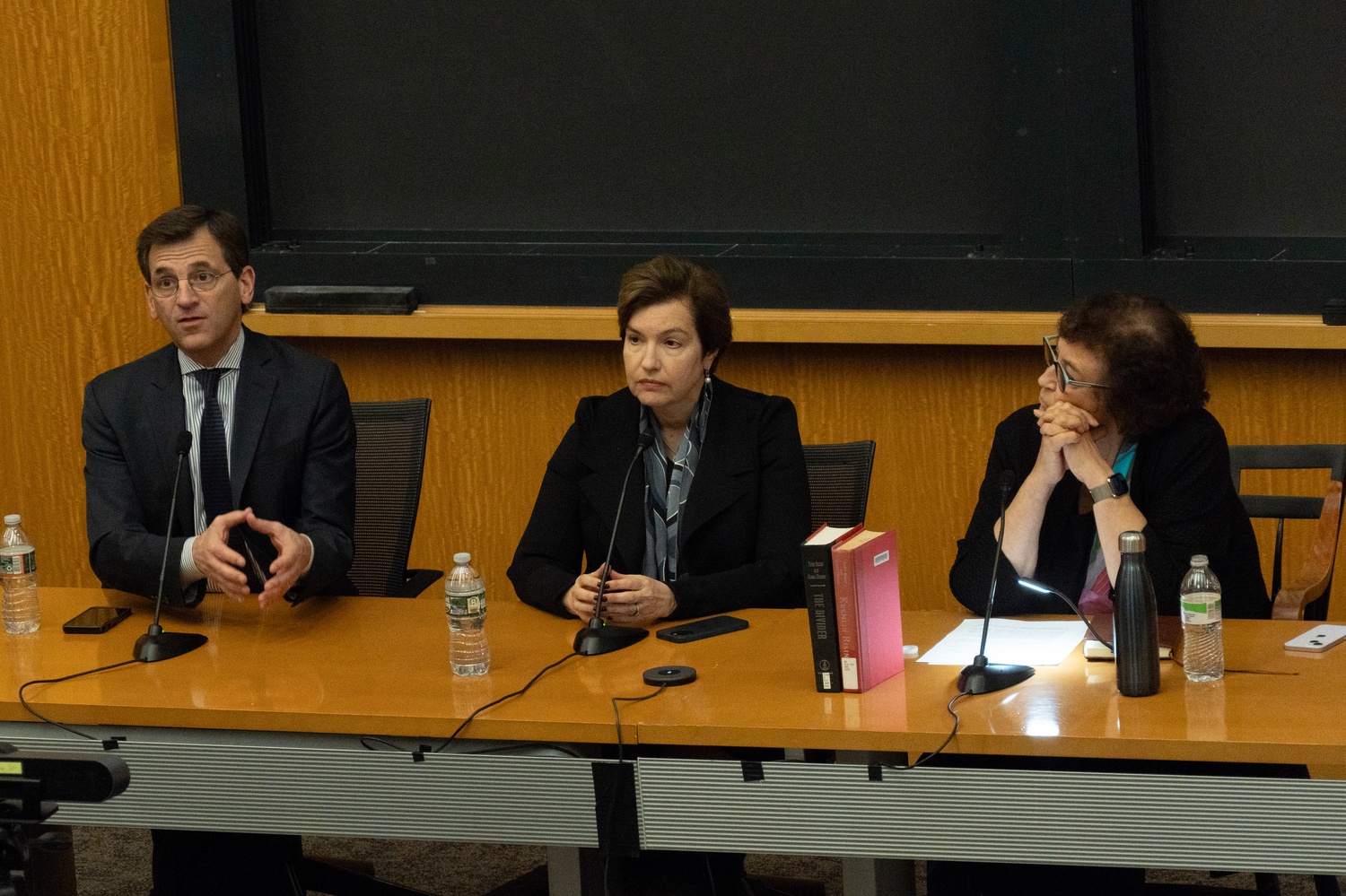
News
Nearly 200 Harvard Affiliates Rally on Widener Steps To Protest Arrest of Columbia Student

News
CPS Will Increase Staffing At Schools Receiving Kennedy-Longfellow Students

News
‘Feels Like Christmas’: Freshmen Revel in Annual Housing Day Festivities

News
Susan Wolf Delivers 2025 Mala Soloman Kamm Lecture in Ethics

News
Harvard Law School Students Pass Referendum Urging University To Divest From Israel
Journalists Say Trump May Exchange Russia Sanctions for Ukraine Peace Deal

Peter Baker, a senior White House correspondent for the New York Times, said President-elect Donald Trump may drop U.S. sanctions on Russia in exchange for a deal on Ukraine during a talk on Tuesday about the incoming Trump administration’s foreign policy toward Russia.
The event, which was sponsored by the Davis Center for Russian and Eurasian Studies, featured Baker and Susan B. Glasser ’90, a columnist with the New Yorker. Baker and Glasser, who are married, served as the Moscow bureau chiefs for the Washington Post from 2001 to November 2004. Yevgenia Albats, the editor-in-chief of the New Times — a Russian news magazine, moderated the talk.
Baker and Glasser, a former Crimson managing editor, said they expect the Trump administration will likely be more friendly to Russia, marking a major shift from President Joe Biden’s staunch support for Ukraine. In particular, Baker said that Trump could consider lifting sanctions on Russia.
“I would assume he would drop all sanctions that he’s allowed to drop if he’s able to,” Baker said.
Though Trump could lift many sanctions on Russia using executive power, there are other sanctions that he could not get rid of without congressional approval. Though Republicans will control the Senate and potentially the House, Baker said that it is unclear that there will be enough Republican support to end certain sanctions on Russia.
Still, Baker noted that Trump had previously expressed a desire to get rid of sanctions on Russian President Vladimir Putin’s regime during his first term in office.
“He actually was ready to drop some of the sanctions that had been imposed on Putin for the 2016 election interference,” Baker said. “Until Mitch McConnell basically stopped him and said, ‘If you do that, I will legislate them.’”
Albats asked Glasser and Baker if they believed that Trump and his advisers were equipped to engage in diplomacy with Putin, who she described as a “very smart evil man.”
Glasser said that Trump and his foreign policy advisers don’t know a lot about Moscow and the region.
“I don’t think there’s a lot of Russia expertise in this group,” Glasser said. “He doesn’t do the homework,” she added. “He doesn’t prepare. He doesn’t like to prepare.”
Glasser said that Trump is a “highly manipulable” character and that she would not be surprised if Putin tries to do so in the future. She noted that some of Putin’s mind games with Trump may have already begun, citing a segment aired on Russian state television during its coverage of Trump’s election victory.
Russia-1 — the country’s main state-run television channel — showed nude images of Trump’s wife, Melania Trump, during a recent broadcast. Glasser said that she could not imagine the segment had not been approved by the Kremlin if not Putin himself.
“That is the most direct kind of personal insult to Trump,” she said. “And I think it’s very important that we take that seriously.”
Baker and Glasser also said that Trump’s preference for authoritarian leaders — particularly Putin — wasn’t just about policy. They said that Trump has a “lifelong preference for dictators, strong men, and authoritarians” that shapes his “few, very crudely defined thoughts about the world.”
Baker said that Trump’s assertion that he would end the war in Ukraine in 24 hours — a line he frequently repeated on the campaign trail — was “ridiculous.”
However, Baker and Glasser said it is likely that the Trump administration would try to force Ukraine to trade land for a peace deal.
“Now, what Ukraine gets out of that, other than the end of the war, isn’t really very clear,” Baker said. “Why [Ukrainian President Volodymyr] Zelensky would go along with that, also not so very clear.”
“Clearly the worry on the part of Ukraine advocates is that they would use the levers of money to try to force Zelensky into making such a deal,” Baker said.
Want to keep up with breaking news? Subscribe to our email newsletter.
Most Read
- Harvard President Alan Garber Abruptly Cancels Spring Break Trip to India
- Longtime Campus Rabbi Getzel Davis Resigns From Harvard Hillel
- As Trump Slashes Federal Grants, the Harvard School of Public Health Has the Most To Lose
- Harvard Has To Make Up Its Mind About General Education
- Give the Land Up — Or Shut Up
From Our Advertisers

Over 300+ courses at prestigious colleges and universities in the US and UK are at your disposal.

With innovative financial tools combined with financial education, Collegiate empowers students to take control of their finances and build confidence in their money management skills.

Serve as a proctor for Harvard Summer School (HSS) students, either in the Secondary School Program (SSP), General Program (GP), or Pre-College Program.

With an increasingly competitive Law School admissions process, it's important to understand what makes an applicant stand out.

Welcome to your one-stop gifting destination for men and women—it's like your neighborhood holiday shop, but way cooler.

Admit Expert is a premium MBA admissions consulting company, helping candidates secure admission to top B-schools across the globe with significant scholarships.
